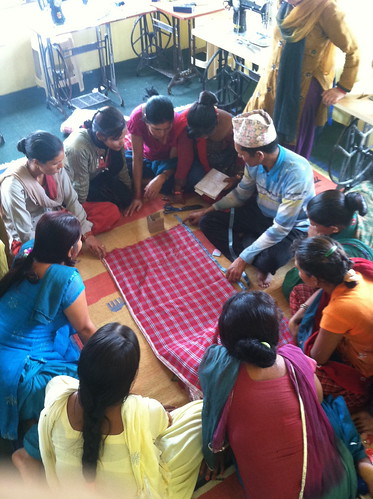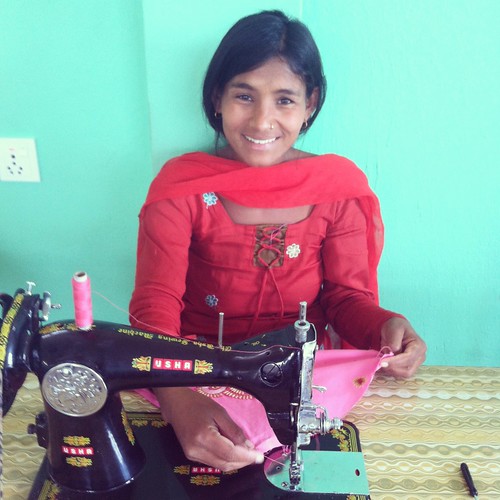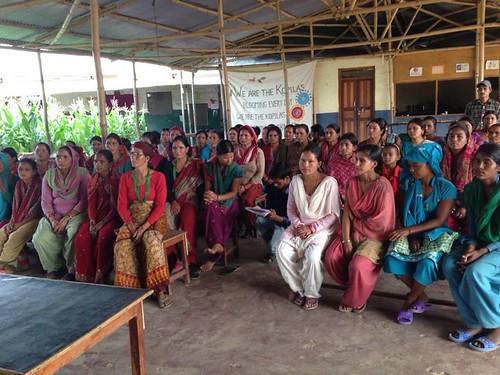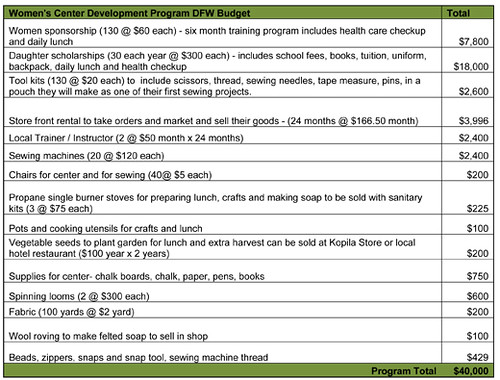
Mission

“To create a self-sustainable living community for destitute children that provides their most basic needs and also contributes to post-war recovery and peace in the nation of Nepal.”
The BlinkNow Foundation Philosophy: “We believe that to solve any problem one must reach the source. Our organization operates at the grassroots level of community and focuses on promoting sustainability and self-reliance in everything that we do. This organization will not offer the band-aid solution or quick fix money to individuals. We believe that if given the proper tools and initiatives, people and communities anywhere in the world can raise themselves out of poverty. We will focus on building and growing the communities we work within as a whole, by implementing programs that reach the poorest and benefit the whole.”
What we are funding
DFW’s grant of $40,000 will pay for Scholarships for girls (school fees, books, backpack, daily lunch and health checkup), supplies for the Women’s Center (chalk boards, paper, pens, books, sewing tool kits and sewing machines, propane single burner stoves, pots and cooking utensils, vegetable seeds, fabric, and more), and funding for a local trainer/instructor.
Life Challenges of the Women Served

For women and girls in Nepal, equal opportunities do not exist. Due to lack of education, Nepalese girls are at a great risk of being trafficked into the sex trade industry, enslaved as unpaid domestic servants, or working in low-paying and often dangerous sweat shops.
Very often, fathers and husbands leave for India to work as migrant workers, abandoning the women and children to fend for themselves. Some men send money, but often the men do not return and women become desperate if they cannot care for their children.
“Suicide has emerged as the single leading cause of death among women in Nepal aged 15-49, outranking other causes such as accidents and disease, according to a government study”, claims an Integrated Regional Information Networks (IRIN) news article dated January 21, 2010. The same article quotes Sushil Baral, health adviser for the Nepal office of the UK Department for International Development (DFID), one of the study’s funders, as saying, “We need more analysis to find the causes behind suicide, in order to go forward to address this serious concern at the community level.”
The Project

The Women’s Empowerment Center opened in 2013 with the recognition that social justice and sustained economic growth cannot be achieved without opportunities for women and that children need a thriving home life in order to succeed at school. Today, 70 women are enrolled in daily classes, learning life skills and literacy and gaining tools to launch their economic self-sufficiency and improve the health of their children and families. The women sew school uniforms, backpacks, sweaters, and warm winter pajamas for all of the students in the school. They also sew reusable cotton sanitary napkins, which they sell in the community.
In learning these skills, they are better positioned to ensure their own daughters are educated, thus reducing their risk of exploitation, increasing the likelihood their daughters will postpone marriage and childbirth, and ultimately leading to a more skilled and productive labor force in the community.
Kopila Women’s Empowerment Center will provide programming and resources to local marginalized and vulnerable women affected by gender violence, inequality, forced marriage, and lack of access to basic health care. By providing training, health care, and literacy programs along with vocational training skills, The BlinkNow Foundation hopes to create income generation and job security while promoting gender equality in the region. The program will enroll an additional 130 extremely impoverished women from the local community in a vocational training program in which they can select from a range of classes that interest them and attend regular trainings and support meetings for 6 months.
In addition, 60 Daughter Scholarships will be offered to daughters of the women. These one-year scholarships to Kopila School include tuition, uniforms, back-packs with school supplies, books, and basic health care needs like dental care, de-worming, and vitamins.
Girls and women are selected to participate in the program on the basis of both need and high motivation. Currently the women in the program are relatives – aunts, grandmothers, older sisters, and mothers – of the children in the Kopila Valley School. Due to the organization’s deep roots in the community, many of the women have been invested and involved in the construction and operations of the children’s home, school, medical clinic, and gardening program, and there is high demand to participate. As a result, the Women’s Center has an extensive screening and selection process that involves the local Nepali board, comprised mostly of women, village elders, and leaders. The goal is to select participants who will not only finish the program but also have a personal commitment and desire to succeed so that they will stay in the community and make positive contributions toward its betterment.
Questions for Discussion
- Why does the Kopila Women’s Empowerment Center focus on literacy, skill building, and empowerment of women as an essential element to the success of the children?
- How does strong community support help the causes of both the school children and the women in the Women’s Center?
- Why do you think that, in addition to learning a marketable skill, basic reading, writing, and financial literacy are building blocks for an illiterate woman’s chances for empowerment and self-sufficiency?
How the Grant Will be Used

Why We Love This Project/Organization
The primary mission of The BlinkNow Foundation is to address the needs of orphans and at-risk children, but after four years of running the Kopila Valley School, they were frustrated that children were still vulnerable to abuse and neglect. The BlinkNow Foundation staff came to believe that in order for the children to succeed, their home lives needed to improve. In order to solve the problem more holistically and to acknowledge the high suicide rate among women in Nepal, the Women’s Empowerment Center was created to target women’s issues in the home. We also love the program because Kopila Valley School is committed to sustainability – they raise, grow, or buy everything that they eat and use within a 5-mile radius. Last but not least, we resonate with the founder’s very inspirational story.
Evidence of Success
In May of 2013 the launch of the Kopila Women’s Center resulted in an astounding outpouring of interest, enthusiasm, and participation among women in the village and community. During the first meeting, spread by word of mouth, over 100 women came to get information and learn how they could become part of the center. As women of all ages continued to pour in by the dozens, the organization realized they had tapped into a major need in the community. Staff has reported that the women currently in the program have become a family who support and encourage one another. With access to medical and counseling resources, they are healthier, happier, and more self-confident. The women are more positive and have a better outlook on life now that they have a safe and fun place to come spend some time each day.
Voices of the Girls
- “Today I learned to look forward and trust in my ability and I should be confident. If I look backward, I will always be in the past, but if I look forward, I can improve my position.” — Shanti Tolangi
- “I used to cut wood and sell it, but now I am learning to sew and I want to do this as my business.” — Dan Rupa B.K.
- “The Nepali woman’s problem is that their husbands drink alcohol and beat them. All women should be united and give their brothers and husbands advice against domestic violence.” — Shanti Tolangi
About the Organization
BlinkNow is a grass-roots organization working to empower young people to become pioneers in developing their own solutions to world poverty. The organization targets under-developed, war-torn countries where extreme poverty exists. These nations have high rates of illiteracy, disease, child labor, and unstable governments. The organization established Kopila Valley Children’s Home, its initial project, in Nepal.
— Maggie Doyne, founder
Maggie arrived in Nepal in 2006 at the age of 18 to a country ravaged by 13 years of civil war. She was shocked by the poverty and by the number of homeless, orphaned children she saw. She started her journey when she enrolled a little girl into school after seeing her breaking rocks for money in order to eat. The number of children she enrolled in school grew and grew until she realized she needed to address the children without families who were facing homelessness. She ultimately purchased land with her life’s savings – $5,000 she had saved from babysitting – and opened the Kopila Children’s Home in 2008 when she was 21. Today, Kopila’s family has grown to more than 40 beautiful, happy and thriving children. The home is legal guardian to the children, and Maggie is mother to each of them.
After opening the home, the organization quickly learned that they needed to provide their own children and most of the destitute children in the community with a quality education. In 2010, the community-built bamboo Kopila Valley Primary School opened its doors on leased land. Students are provided nutritious food, clean water, medical care and uniforms. They are given a multidimensional educational experience that both embodies and reaches beyond the classroom that is expected to better prepare the children for the modern globalized era and at the same time instill them with a strong sense of cultural identity and connection to their land and heritage.
BlinkNow believes that a healthy environment and community is a necessary part of a holistic education and they want to create a living classroom for the valley by educating the community about waste management and pollution prevention through workshops and capacity building. Surkhet is not exempt from the challenges of rapid development, and BlinkNow wants to be an agent of positive and intentional change for the village.
Where They Work
Nepal is a land-locked mountainous country roughly the size of Arkansas that lies between India and Tibet. Nepal contains Mount Everest (29,035’), the tallest mountain in the world.
BlinkNow’s Kopila Valley Children’s Home is located in Surkhet, a small trading-post city at the foothills of the Himalayas. Surkhet is one seventy-five districts of Nepal which lie in the Bheri Zone of the MidWestern Development Region of Nepal.
Most of the people in the village work as subsistence farmers or as laborers. So far, hundreds of community members have taken part in the construction of the Kopila Valley Home and School, including many local women who carried the materials and worked on the construction projects.
Source Materials
- Documentation and images provided by The BlinkNow Foundation to Dining for Women
- Nepal: Maps, History, Geography – Infoplease.com –
- “Nepal: Why are so many women killing themselves”, Integrated Regional Information Networks News (IRIN), January 21, 2010
- “Women, Bought and Sold in Nepal,” New York Times. (2013)
- “Literacy Rates are the Lowest in the World” – World Economic Forum – The Gender Gap Report 2013
— Prepared by Janine Baumgartner
